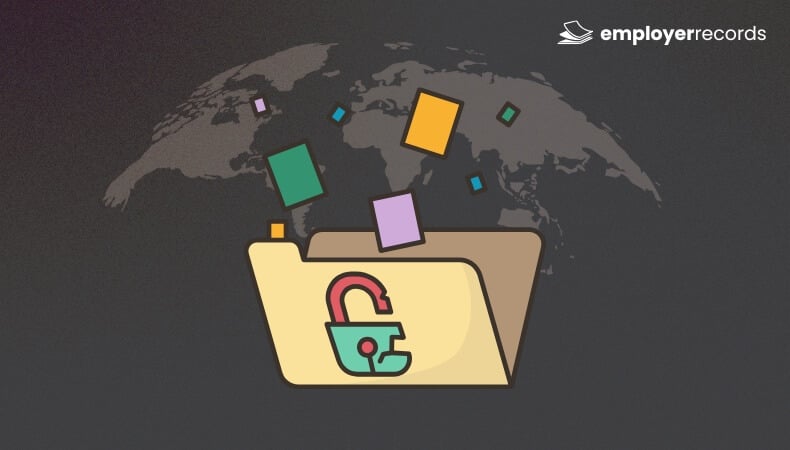The global workforce is experiencing a transformative shift as remote work becomes increasingly prevalent. Companies are no longer confined by geographical boundaries, seeking talent across continents to drive innovation and competitiveness.
However, this expansion introduces complexities in compliance, payroll, and employee management, particularly when navigating diverse international labor laws. Enter the Employer of Record (EOR) model, a strategic solution enabling businesses to hire internationally without establishing local entities.
EORs assume the legal responsibilities of employment, including tax compliance, benefits administration, and adherence to local regulations, allowing companies to focus on their core operations.
As we look ahead, EORs are poised to play a pivotal role in shaping the future of remote hiring, offering scalable and compliant pathways to global talent acquisition.
This article explores the evolving landscape of remote work, the benefits and challenges of the EOR model, and how organizations can leverage EORs to build resilient, diverse, and agile teams in an increasingly interconnected world.
What Is An Employer Of Record (EOR)?
An Employer of Record (EOR) is a third-party organization that legally employs workers on behalf of another company. While the EOR handles administrative tasks like payroll, taxes, benefits, and compliance with local labor laws, the client company directs the day-to-day activities of the employees.
This arrangement allows businesses to hire in countries where they lack a legal presence, simplifying global expansion. By assuming the legal responsibilities of employment, EORs enable companies to focus on their core operations while ensuring adherence to local employment regulations.
This model is particularly beneficial for organizations seeking to tap into international talent pools without the complexities of establishing foreign subsidiaries.
The Rise Of Remote Work And Global Talent Acquisition
The COVID-19 pandemic accelerated the adoption of remote work, and this trend shows no signs of slowing down. According to a study by Upwork, 22% of the American workforce will be fully remote by 2025.
This shift enables companies to tap into a global talent pool, offering diverse perspectives and skills.
However, hiring internationally introduces complexities in legal compliance, payroll, and benefits administration. EORs mitigate these challenges, making global hiring more accessible.
Benefits Of Using EORs For Remote Hiring
In today’s globalized business environment, companies are increasingly seeking talent beyond their local markets. However, navigating the complexities of international employment laws, tax regulations, and administrative processes can be daunting.
Employing an Employer of Record (EOR) can significantly streamline the process of hiring remote workers across borders. By handling legal and administrative responsibilities, EORs enable businesses to focus on growth and innovation.
Let’s delve into the key benefits of utilizing EOR services for remote hiring.
- Compliance Assurance: Employer of Record (EOR) services ensure that your hiring practices align with local labor laws, tax regulations, and employment standards in each country. By managing legal responsibilities, EORs mitigate the risk of non-compliance, protecting your business from potential fines and legal complications.
- Simplified Payroll and Benefits: Managing payroll and benefits across multiple countries involves navigating various currencies, tax systems, and employment laws. EORs streamline this process by handling payroll calculations, tax withholdings, and benefits administration, ensuring timely and accurate compensation for your international workforce.
- Faster Market Entry: Establishing a legal entity in a new country can be time-consuming and costly, often taking several months. EORs enable companies to hire and operate in new markets quickly by leveraging their existing legal infrastructure, allowing businesses to capitalize on opportunities without delay.
- Cost Efficiency: Setting up and maintaining international entities involves significant expenses, including legal fees, administrative costs, and ongoing compliance management. By outsourcing these functions to an EOR, companies can reduce overhead costs and allocate resources more effectively toward core business activities.
Emerging Trends In EOR And Remote Hiring
As the global workforce continues to evolve, the Employer of Record (EOR) model is adapting to meet new challenges and opportunities in remote hiring.
Several emerging trends are shaping the future of EOR services, driven by technological advancements, changing workforce expectations, and the need for compliance in a complex regulatory landscape.
These developments are not only enhancing the efficiency and scalability of EOR solutions but also redefining how businesses approach international talent acquisition.
Below, we explore the key trends influencing the EOR landscape and their implications for remote hiring strategies.
Integration of AI and Automation
EOR providers are increasingly leveraging AI to streamline onboarding, compliance checks, and payroll processing. Automation reduces errors and enhances efficiency, providing a smoother experience for both employers and employees.
Focus on Employee Experience
Beyond administrative functions, EORs are prioritizing employee engagement and satisfaction. Offering competitive benefits, clear communication, and support services ensures higher retention rates in remote teams.
Expansion into Emerging Markets
As businesses seek growth opportunities, EORs facilitate entry into emerging markets by navigating local employment laws and cultural nuances. This support is crucial for successful international expansion.
Challenges And Considerations
While the Employer of Record (EOR) model offers significant advantages for global expansion and remote hiring, it’s essential to recognize and address potential challenges.
Understanding these considerations ensures that businesses can make informed decisions and effectively manage their international workforce.
- Limited Control Over HR Processes: Engaging an EOR means relinquishing some control over HR functions, such as benefits administration and compliance management. This can lead to discrepancies between a company’s internal policies and those implemented by the EOR.
- Potential Misalignment in Company Culture: Since the EOR handles onboarding and certain HR activities, there might be challenges in instilling the company’s culture and values in the new hires, potentially affecting employee engagement and retention.
- Hidden Costs and Fees: Some EOR providers may have complex pricing structures with hidden fees, such as setup charges, administrative costs, or additional fees for services beyond the standard offering.
- Compliance Risks in Specific Jurisdictions: While EORs handle compliance, certain countries have intricate labor laws that might still expose companies to risks, especially if the EOR lacks expertise in that specific region.
- Data Security Concerns: Sharing sensitive employee information with a third party introduces data protection risks. It’s crucial to ensure that the EOR has robust security measures in place to safeguard this data.
Conclusion
The future of remote hiring is intrinsically linked to the capabilities of Employers of Record (EORs). As businesses increasingly embrace global talent and flexible work arrangements, EORs provide the necessary infrastructure to navigate the complexities of international employment.
By managing compliance, administrative tasks, and cultural nuances, EORs empower companies to build diverse, distributed teams poised for success in the evolving global landscape.
EORs handle critical functions such as payroll, tax compliance, and benefits administration across various jurisdictions, allowing organizations to focus on strategic growth without the burden of establishing local entities.
This model not only accelerates market entry but also ensures adherence to local labor laws, mitigating potential legal risks. Furthermore, EORs facilitate access to a broader talent pool, enabling companies to tap into specialized skills and diverse perspectives that drive innovation and competitiveness.
As the remote work paradigm continues to evolve, leveraging EOR services will be instrumental in building agile, resilient, and globally integrated workforces.







